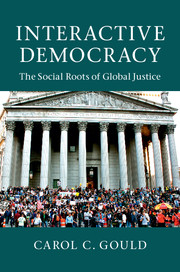Book contents
- Frontmatter
- Dedication
- Contents
- Acknowledgements
- Introduction
- Part I A theoretical framework
- 1 A human rights approach to global justice: elements of theory and practice
- 2 A social ontology of human rights
- 3 Interpreting freedom dynamically: beyond liberty and autonomy to positive freedom
- 4 Is there a human right to democracy?
- Part II The social roots of global justice
- Part III Interactive democracy – transnational, regional, global
- Works cited
- Index
- References
4 - Is there a human right to democracy?
Published online by Cambridge University Press: 05 September 2014
- Frontmatter
- Dedication
- Contents
- Acknowledgements
- Introduction
- Part I A theoretical framework
- 1 A human rights approach to global justice: elements of theory and practice
- 2 A social ontology of human rights
- 3 Interpreting freedom dynamically: beyond liberty and autonomy to positive freedom
- 4 Is there a human right to democracy?
- Part II The social roots of global justice
- Part III Interactive democracy – transnational, regional, global
- Works cited
- Index
- References
Summary
Introduction
A human right to democracy is controversial, at least among political philosophers, if not on the streets of Tunisia, Egypt, Syria, and even Iran. Although the UDHR specifies a right to take part in the government of one’s country – including free elections with universal suffrage – in an Article sometimes referred to as specifying a right to democracy, the term democracy is not explicitly mentioned, perhaps because of political concerns at the time of its drafting. Indeed, some philosophers have advanced influential arguments against recognizing such a human right, generally proceeding from within a Rawlsian framework of justice. In this chapter, I begin by considering – and putting aside – some of the objections that have been lodged against recognizing democracy as a human right. Among these objections are:
(1) that if democracy were recognized as a human right, that would enable forcible intervention to impose it on countries that lack it, which would in turn involve interference with the internal affairs of the country involved;
(2) that requiring democracy would also violate the premier human right of self-determination and would additionally not show an appropriate level of toleration for societies that are not fully liberal though presumably respectful of human rights (what Rawls calls “decent societies”);
(3) and relatedly, that it would involve a Western or liberal imposition on societies organized around a common good or social harmony conception; and
(4) perhaps most problematically, that democracy requires equality, which is too demanding for some societies, and is not required by a minimal or less demanding list of human rights.
- Type
- Chapter
- Information
- Interactive DemocracyThe Social Roots of Global Justice, pp. 81 - 96Publisher: Cambridge University PressPrint publication year: 2014



